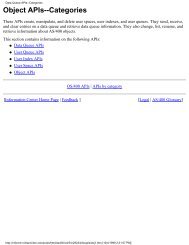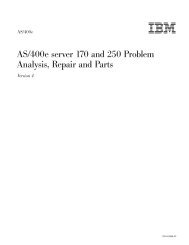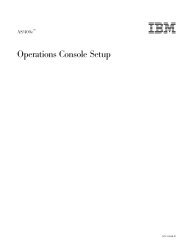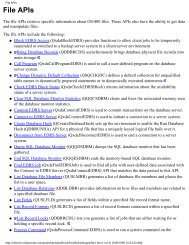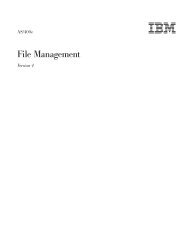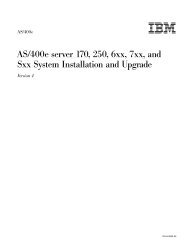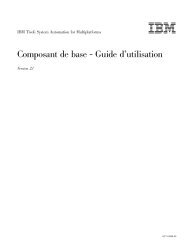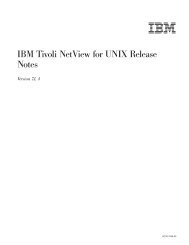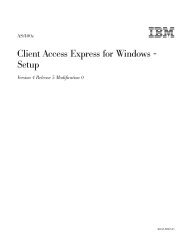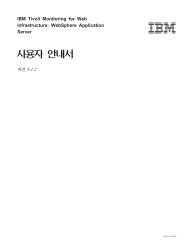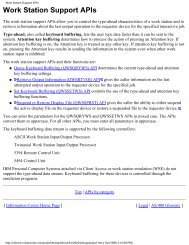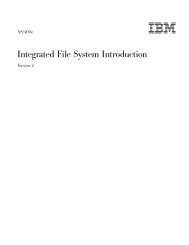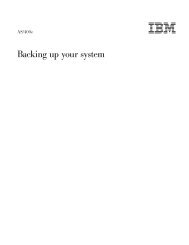Qshell Interpreter (qsh) - FTP Directory Listing - IBM
Qshell Interpreter (qsh) - FTP Directory Listing - IBM
Qshell Interpreter (qsh) - FTP Directory Listing - IBM
Create successful ePaper yourself
Turn your PDF publications into a flip-book with our unique Google optimized e-Paper software.
Command substitution<br />
1. Path name expansion is not performed on the results of the expansion.<br />
2. Field splitting is not performed on the results of the expansion, with the<br />
exception of @ special parameter.<br />
A parameter expansion can be modified by using one of the following formats.<br />
${parameter:-word}<br />
Use Default Values. If parameter is unset or null, the expansion of word is<br />
substituted. Otherwise, the value of parameter is substituted.<br />
${parameter:=word}<br />
Assign Default Values. If parameter is unset or null, the expansion of word<br />
is assigned to parameter. In all cases, the final value of parameter is<br />
substituted. Only variables, not positional parameters or special parameters,<br />
can be assigned in this way.<br />
${parameter:?[word]}<br />
Indicate Error if Null or Unset. If parameter is unset or null, the expansion of<br />
word (or a message indicating it is unset if word is omitted) is written to<br />
standard error and a non-interactive shell exits with a nonzero exit status.<br />
Otherwise, the value of parameter is substituted.<br />
${parameter:+word}<br />
Use Alternate Value. If parameter is unset or null, null is substituted.<br />
Otherwise, the expansion of word is substituted.<br />
In the preceding four parameter expansions, using a colon in the format results in a<br />
test for a parameter that is unset or null; removing the colon results in a test for a<br />
parameter that is only unset.<br />
${#parameter}<br />
String Length. If parameter is @ or * the number of positional parameters is<br />
substituted. Otherwise, the length of the value of parameter is substituted.<br />
${#parameter%word}<br />
Remove Smallest Suffix Pattern. The word is expanded to produce a<br />
pattern (page 18). Then the result is parameter after removing the smallest<br />
portion of the suffix matched by the pattern.<br />
${#parameter%%word}<br />
Remove Largest Suffix Pattern. The word is expanded to produce a pattern<br />
(page 18). Then the result is parameter after removing the largest portion of<br />
the suffix matched by the pattern.<br />
${#parameter#word}<br />
Remove Smallest Prefix Pattern. The word is expanded to produce a<br />
pattern (page 18). Then the result is parameter after removing the smallest<br />
portion of the prefix matched by the pattern.<br />
${#parameter%word}<br />
Remove Largest Prefix Pattern. The word is expanded to produce a pattern<br />
(page 18). Then the result is parameter after removing the largest portion of<br />
the prefix matched by the pattern.<br />
Command substitution allows the output of a command to be substituted in place of<br />
the command name itself. Command substitution occurs when the command is<br />
enclosed as follows:<br />
Chapter 3. Command Language 17



